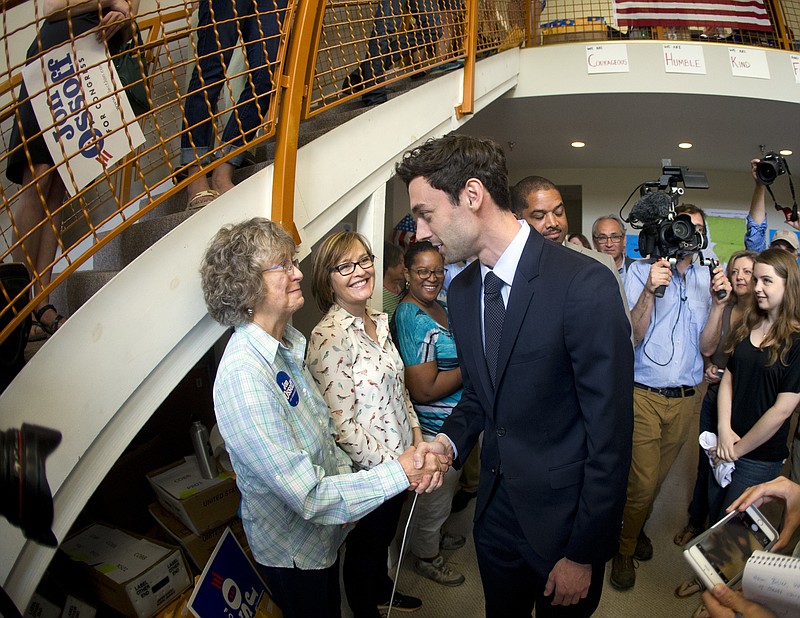Democrats are hoping Americans will swallow what they're offering - hook, line and sinker.
- Democrats are united and energized.
- Republicans regret their presidential vote in November.
- The Trump administration is in free fall.
It's the scenario painted for readers, watchers and listeners on a daily basis by national media outlets. But the reality is somewhat different.
The Democratic Party would like people to believe its resistance to everything Trump is the 2017 version of the 2009-2010 conservative tea party movement. In that fantasy, such resistance would lead to what happened with Republicans in 2010 and 2014 when they captured majorities in the United States House and Senate, respectively.
However, there are a number of differences. The tea party movement was grassroots and not party driven, was centered more on government spending than strict opposition to a president (some adherents thought President George W. Bush erred on allowing bank bailouts in 2008, after all), and the tea party sought a more defined result of stopping out-of-control spending than the Democrats' desire to return the country to the far left policies it had been governed under for the last eight years.
Locally, regionally and nationally, the results have been underwhelming.
Last Tuesday, a local anti-Trump organization could rally only around 35 people to Miller Park to protest what they say is their congressional representatives' decision to avoid their constituents.
Spokespersons for the group were Dr. Mary Headrick, the Democrat who lost to U.S. Rep. Chuck Fleischmann in 2012 and 2014, Melody Shekari, who lost to Fleischmann in 2016, and Khristy Wilkinson, who lost to state Sen. Todd Gardenhire in 2016 and now is the president of the Hamilton County Democratic Party.
The local protest is the same scheme tried around the country - accusing Republicans of not being responsive to voters because they have not agreed to show up on the date, at the time and in the place as requested by a group wanting to heckle and berate them for not doing specifically what the inviting group wants.
Republicans Fleischmann and U.S. Sens. Lamar Alexander and Bob Corker all have, from time to time, availabilities where constituents either can hear them or speak with them. And though congressional representatives are answerable to their districts and states, they shouldn't feel the need to be held hostage by anti-GOP, anti-Trump or pro-left wing policy groups.
We believe the majority of Tennesseans see through such protests.
Regionally, Democrats had all but seated Jon Ossoff in the U.S. House based on what they believed would be his majority vote in Tuesday's special "jungle" election to replace U.S. Rep. Tom Price, who is now the U.S. Secretary of Health and Human Services. A "jungle" election allows candidates of all parties to run on the same ballot, with the top two advancing to a runoff.
Democrats around the country poured more than $8 million into the race (95 percent from out of state), U.S. House staffers came to work the district, Hollywood celebrities arrived to campaign with him, and the telegenic, 30-year-old filmmaker even promised to move into the district if he won.
The win, Democrats declared, would thoroughly embarrass Trump, would flip a seat held by Republicans (including former U.S. Speaker of the House Newt Gingrich) for nearly 40 years and would signal the state is turning blue (Democratic).
Indeed, Ossoff's donor appeals urged supporters to "Make Trump Furious."
However, Ossoff, while getting 48.1 percent of the vote, underperformed in not winning a majority. He now must face former Georgia Secretary of State Karen Handel, the top vote-getting among 11 Republicans in the race, in a June 20 runoff.
Nationally, while Republicans are said to be resolutely split over the recent failure of their repeal and replacement of Obamacare, Democrats are portrayed as one in harmony on policy and direction. But the party's unity tour tells a different story.
The tour features Sen. Bernie Sanders, I-Vt., the self-proclaimed democratic socialist who was runner-up to Hillary Clinton for the Democratic presidential nomination in 2016, and Tom Perez, the new chairman of the Democratic National Committee (DNC).
In Maine for the first stop of the party's "Come Together and Fight Back" event, Sanders, who has called for the party to have a "top-down overhaul," was loudly cheered, but Perez was roundly booed before the emcee ever got his name out.
Then, Sanders claimed the party was "giving up" in referencing the DNC's apathy in not putting more resources into a recent special congressional election in Kansas, while Perez the next day claimed a six-point loss in the race was a "success."
And the type of unity Perez espoused was somewhat less than befitting a representative of the party that believes itself to be tolerant, respectful of others and the righteous leader in public discourse.
The GOP, he said was offering a "s--y budget" and "does not give a s-- about the people they are trying to hurt."
So much for unity. So much for the Democratic message.
Just don't swallow it
